![]()
THE PRO-FILE
THE PERFORMANCE OF CHAMPIONS (Part Two)
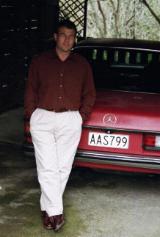
|
In the second part of this interview Mark Sutherland, whose performance expertise was developed coaching Olympic Athletes, discusses the value of rehearsal and explores why understanding the process involved in the performance is an essential ingredient of success. He also explains why it's important to take responsibility for all your choices and shares his pro-active approach to goal setting. Mark applies his understanding of process to more areas than coaching athletes - he also consults with business applying the same formulas to pursuing success in this arena. |
Richard: What are the ingredients of a good training process?
Mark: Good training processes make sure that rehearsal equals performance. That's the bottom line. Rehearsal should equal performance. Whatever you do in rehearsal you've got to take to the performance. Whatever you do in training…like in golf for example the last practice stroke before the putt should be exactly what you are going to do the in the putt. You are taking that last practice stroke to the ball and duplicating it 'cos that is exactly what should take place. I guess it's the same for an actor…. The difference is that you can re-take and re-take, in sport we don't get that luxury. If the gun goes, it's all on and if you are not ready it's all over you don't get a "second shot"….
Richard: They can't say, "Excuse me! I think I can do that better could we do it again?"
Mark: That's right. You watch some of the great sports movies like "Any Given Sunday" or "Chariots of Fire", those race starts would have been done many different ways - the true Olympian gets one shot - if it's a hundred metre sprint it's all over in ten seconds. If you blow the start you blow the four or eight years training that you have just done. That's why elite sport is so different from everything else.
For example, Grant Waite this morning at the Canadian Open was six minutes late. If you are five minutes late you get a penalty he was six minutes late - he got disqualified. One minute over the late time at the tee and he was disqualified. Previously this man was second to Tiger Woods in a play off and this year he's not playing. He blew it. And he's the only one responsible. No one else can take the blame - in sport you don't get a second chance.
Richard: Actors like athletes have to develop their skills but they also have to rehearse so they can work at applying their skills to a production. Is there a parallel for the athlete?
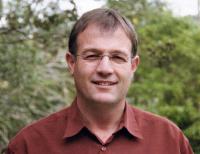 Mark:
Yeah.
You practice all your skill components but you also do rehearsal
practice… just like playing a match. Look I am coaching
"Coast to Coast" athletes at the moment - so they've
got to go from the west coast to the east coast as fast as they
can - it takes two days.
Mark:
Yeah.
You practice all your skill components but you also do rehearsal
practice… just like playing a match. Look I am coaching
"Coast to Coast" athletes at the moment - so they've
got to go from the west coast to the east coast as fast as they
can - it takes two days.
Richard: On foot?
Mark: No - kayaking, cycling and running. There's a one-day event and a two-day event. Now, part of the rehearsal is doing seven hour training sessions because they are going to do seven hours a day in the "Coast to Coast".It's like a rehearsal. And they might do three of those between now and February - just to rehearse.
This is not because they need to run so many kilometers. What it is about is learning how to stay awake for seven hours; how to keep themselves on the go for seven hours; how to feed themselves properly for seven hours; how to stay warm if they are getting cold. The whole rehearsal thing is so important. Has to be done.
Richard: So there are two areas? There is the building the skill area and there is rehearsing the event? The parallels are very strong between our two worlds aren't they?
Mark: The parallels are strong with everything. For example in business if you are going to pitch for twenty million dollars worth of contract you have to get all the components of your presentation together and then you need to practice it - you have to get it slick so the presentation is smart - it's exactly the same if you are operating in the sports field. You have to understand the components and practice it so that it works well. To me it's black and white. If it's too sophisticated then …….there are too many simple things being screwed around. Everything is pretty simple when it gets down to brass tacks. When you get down to basics there is not a great deal that is sophisticated. Experts in any field do their job well because to them it is simple. So, if you can get people to think that what they are doing is really simple - then it makes life a whole lot easier.
Richard: But to understand that things are simple surely you must have a clear understanding of what makes something tick. Otherwise people get confused ….. and put effort into ingredients that are not going to produce results.
Mark: Correct. There has to be 'understanding'.
If there is no understanding then we work on it together …. and my skill is to analyse whether they are onto it or not and to help them figure it out. Once they figure it out it becomes simple for them. If I figure it out and tell them the solution they don't own anything. They don't own the problem and they don't own the solution. If I ask them questions get them to try something and they come up with the solution then they have worked through the process to get to a solution and then it is simple for them. It's only not simple if they don't understand the process.
Richard: That's what actor's call rehearsal and that's how a rehearsal should work.
Mark: It's also a case of finding out which things will trigger the individual's process and enable them to do that. One athlete or actor will have a different process to get to the same point as another.
Richard: Directors sometimes have very different processes from the actors. For example, I like to explore the background of a character's circumstances. Currently I am working with an actor who doesn't like to do this. So if I feed him any of that kind of information he only wants a small amount of it. He may interrupt me with "O.K. I've got that - go away" (laughs) and I'll say, "Right!" However on other occasions I will have to come back and say, "No, you haven't got it! Try this." He will then try that or suggest something himself and between us we work our way through, rather than talk our way through to a solution.
|
Mark: That in its self is a simple process. You understand that he has a different process to you and he understands that too. So you work through that to get to your end result. That's simple. I don't think there is anything that's sophisticated on that score. It's only sophisticated if you don't understand it. Richard: And if you don't understand it but you put your mind to working it out you will succeed because the reason these things are labeled 'knowledge'is because someone else understands it. |
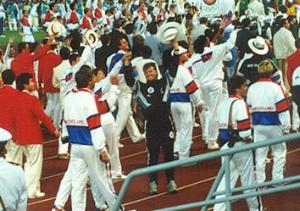 Mark Sutherland at the Olympic closing ceremony 1988. |
Mark: That's right ….if someone else understands it you can too. It's the same in sport.
If we understand a race tactic better than the opposition and we make it simple for ourselves and they see it as difficult, then we have an advantage over them. I have the DVD of the "Patriot" and its cool… they show how they did all the special effects shots. How for example, they banged some guy's head off. You look at it and say "Holy cow! How did they do that?" And then they show you how they did the graphics and how they did the research … they teach you what they did and you say, "That makes sense. That's logical!" … and suddenly it's simple again.
I am very well known in the area in which I work for saying this is a "No B.S. job."
Richard: What does "No B.S." mean?
Mark: No Bull Shit! For example, if we have to get from here to here the fastest way possible…. then let's just figure it out and make it as simple as possible … and that's what we do. I get phenomenal results because it's really simple. It's really simple. I think that's the way most things should operate.
Richard: I agree.
Mark: An athlete sits in my
office and says, "I want to go to the Olympics" and
I say "Well, who is your travel agent?"
"No, no. I want to compete at the Olympics."
"In what event?"
"In running."
"Yes, but what event in running?"
"Oh, the fifteen hundred metres."
"OK, so do you want to just do the heats or you want to
do the finals?"
"Oh no, I want to go in the finals."
"So why do you want to go in the finals?"
"I want to win a gold medal."
"So you want to go to the Olympic games to win a gold medal.
OK that's simple. Now I understand."
Richard: So this is about clearly identifying your goal, isn't it?
Mark: Yeah, that's part of it. You don't go to the Olympics to get warm fuzzies, you go to the Olympics to be the best you can be. If you go for the gold medal and you get in the final and that's the best you can do then you can walk away a hero in your own mind - because you went for it. If you go there just to qualify and you don't get anywhere you get exactly what you asked for. That's the way I look at it:-
"It's what you don't do that counts and what you do, do that counts".
You see everything counts. I'll give you an example. There's a young guy who is a golfer. We were at a club out at South Auckland doing a practice round and he was eighty metres from the green. What he had to do was hit the ball to the front lip of the green so it would roll down to the pin. He took a swing at a ball and it landed at the top of the green, short of the lip and rolled sixty metres back down the hill towards him - it was a fairly steep fairway. So I said to him "What did you tell yourself?"
He said, "I told myself - don't hit the ball too hard because I don't want the ball to go passed the hole."
"Congratulations!
You got what you wanted," I said. "You didn't hit the
ball too hard and it didn't go past the hole." So I said
to him, "What is it that you need to do?"
He replied, "Well, I have to hit it with about 80% power
in the club because I want to land the ball on the front of the
green so it will roll to the pin."
"OK, well do it."
So he did it with an 80% swing and he focused on what his target was and the ball landed on the front of the green and rolled to within three inches of the pin. It was one of those brilliant moments. And I said to him "Congratulations! You got exactly what you asked for again." So, what you do do and you don't do count.
"I don't want it to go past the hole" - and it didn't, it came back to you.
"I do want it to go just beside the hole - and it did
SO, "WHAT YOU DO DO AND WHAT YOU DON'T DO COUNT."
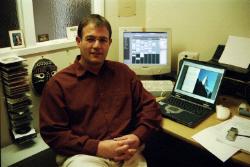 I
always use the analogy of a mountain. If you are climbing and
you make a decision to go on and the weather is good then you
are likely to get the top but if you decide not to go on because
the weather might change then that decision is going to count
as well. Say, the weather doesn't change and you could have gone
on and made it? But if you did go on and the weather did change
then you might get killed. So what you 'decide to do' and what
you 'decide not to do' BOTH MATTER. Most people think it is what
you decide to do that counts more than anything else. I say,
no. What you decide to do and what you decide not to do both
have the same baring on the result. EVERYTHING COUNTS.
I
always use the analogy of a mountain. If you are climbing and
you make a decision to go on and the weather is good then you
are likely to get the top but if you decide not to go on because
the weather might change then that decision is going to count
as well. Say, the weather doesn't change and you could have gone
on and made it? But if you did go on and the weather did change
then you might get killed. So what you 'decide to do' and what
you 'decide not to do' BOTH MATTER. Most people think it is what
you decide to do that counts more than anything else. I say,
no. What you decide to do and what you decide not to do both
have the same baring on the result. EVERYTHING COUNTS.
Richard: You use the mountain analogy in a different sense too, don't you? You use it in relation to planning goals?
Mark: Yes. Goal Mountains come from this great quote by Sherpa Tensing Noregate. (In 1953 Sherpa Tensing conquered Mt Everest with sir Edmund Hilary) "Home is close now I can reach out my hand and almost touch it. But if it is close, it is also far. Much farther than 16,000 feet. As we strap on our oxygen tanks I think back to the boy, so close and so far who had never heard of oxygen, but yet looked at this mountain and dreamed, then we turned around Hilary and I we begin to climb. It is many miles and many years that have brought me to this place." That's Sherpa Tensing from his book "Man of Everest".
Now when he looked at the mountain did he look at the base of the mountain or the top of the mountain?
Richard: Well the shape of the mountain takes his view to the top.
Mark: So he looked at the peak. And from the top his eyes wander all the way down to the base. So as he is looking from the top all the way down he is starting to plan the route - he is starting to see the route he needs to take to get to the top. He sees this by starting at the top and working his way down.
So, what is the second to last thing that has to happen before you get to the top of the mountain … and the third to last thing … fourth to last thing … and the fifth to last thing … all the way down to the 'right now action' … the thing that I have to do right now at this moment to make sure I go through all of those steps to get to the top of the mountain.
Standard goal
management is - there's the goal, there's the top of the mountain
… now where do we start. Stage one …. Stage two …
Stage three…. That's the wrong way round. So what I teach
is that you start at the top and you work your way back down
to the bottom and once your planning has arrived at the bottom
you start the physical journey of doing it.
It's a thing I call Goal Mountain. I spend a lot of time in the
corporate world doing that with companies. They have a good idea
of where they want to get to but what we do is create that big
inspiring picture - this is what it looks like, smells like,
tastes like, feels like - this is exactly what it is like at
the top of the mountain.
Then we decide the second to last thing which has to happen and work our way down to the very smallest thing - maybe 300 or so things. Once we know our starting point that's where we begin. Each point of course may have it's own list of things which need to be done.
It's a simple method based on starting at the top. Too many people look at the base and not the top.
Richard: So tell me about the Merc?
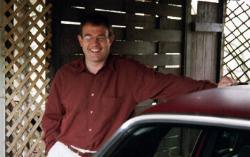 Mark: (Laughs) Oh the Merc! Well I had
three goals when I was seventeen. The first one was to be an
Olympic Coach and coach a champion. The second was to be a professional
coach. And the third one was to own a Mercedes Benz by the time
I was 35 years old. By twenty-seven I was an Olympic Coach with
an Olympic Champion. By twenty nine I was a professional coach
because I chose to work for myself and just before my thirty
sixth birthday I bought the Mercedes - $4,000 worth of 1981,
230E with two hundred thousand kilometers on the clock and it's
been a great car ever since. (Laughs) So, I managed to get the
Merc - found it on this lot and it looked really good.
Mark: (Laughs) Oh the Merc! Well I had
three goals when I was seventeen. The first one was to be an
Olympic Coach and coach a champion. The second was to be a professional
coach. And the third one was to own a Mercedes Benz by the time
I was 35 years old. By twenty-seven I was an Olympic Coach with
an Olympic Champion. By twenty nine I was a professional coach
because I chose to work for myself and just before my thirty
sixth birthday I bought the Mercedes - $4,000 worth of 1981,
230E with two hundred thousand kilometers on the clock and it's
been a great car ever since. (Laughs) So, I managed to get the
Merc - found it on this lot and it looked really good.
So, I phoned my wife and said, "I found it!" She knew exactly what I was talking about and we bought it just to make sure we nailed the goal. It would be nice one day to get the expensive one (laughs) but now the after-school nanny drives it, she loves it. (Laughs) So I managed to get the Merc.
As a coach Mark Sutherland can lay claim to 3 Olympic medals and 4 World Championship medals in kayaking, plus 3 World Championship titles in Surf Ski, Ice Skating and Squash.
< BACK TO THE PRO-FILE
INTRO | ABOUT | WORKSHOPS & CLASSES | TESTIMONIALS | LATEST NEWS | WORKING ACTOR
GREENROOM | DIRECTOR'S NOTES | QUOTARIUM | DIARY | OFF-CUTS | AUDITIONS | CONTACT
All contents copyright © The Rehearsal Room unless othewise stated
|
|
|
|
||||||
|---|---|---|---|---|---|---|---|---|
|
|
|
|
||||||
|
|
|
|